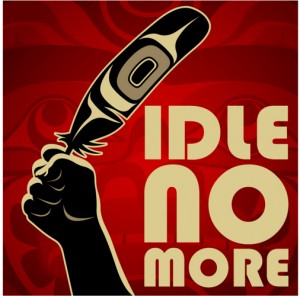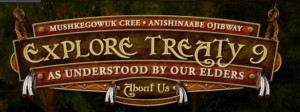 Obx Labs is a program based out of Concordia University that is at the forefront of developing advancements not only in the technology of how we view and create media but also in challenging the type of content that we produce. They were involved in the AbTeC program Skins that aimed to teach Native youth how to create videogames based on their own oral traditions and culture.
Obx Labs is a program based out of Concordia University that is at the forefront of developing advancements not only in the technology of how we view and create media but also in challenging the type of content that we produce. They were involved in the AbTeC program Skins that aimed to teach Native youth how to create videogames based on their own oral traditions and culture.
Category Archives: Archive
Left out of the Conversation: The Digital Divide and #IdleNoMore
This article, written by the Prince Arthur Herald details the #Idle No More movement which is intent on having Aboriginals participate in social media. More importantly it discusses the problem with social media, even ones aimed at facilitating contact among natives. The problem lies with the inequality of internet distribution in Canada. This means that approximately only 50% of aboriginal voices are being heard. This highlights the need to improve infrastructure to make the internet more of a neutral forum.
http://princearthurherald.com/en/author/soo-min-kim-katie-gilfillan-jordana-saab-brault-an
Part 5 of 5
Dr. Suzanne Stewart is a very influential voice in the Native community. In this interview she discusses the importance of understanding education for natives both past and present. She highlights the need to take what was once used to oppress native people (education) and use it as a tool of empowerment. She feels education reform will allow aboriginals to better participate in the global world and also help educate those outside the Aboriginal communities about different, more holistic ways of learning.
Post 4 of 5
Thorton Media
Thorton media’s mission is to provide digital tools aimed at teaching and preserving aboriginal languages. There most popular invention in the past was Rezworld which was essentially a real world simulation using indigenous language. They have expanded to various other platforms, including smartphones with apps that are created by programers working directly with band elders on content. Games or tools are customized to the particular tribe. On the site you will find various links that detail the process as well as information about the company. This site would be a great asset to anyone studying how technology can be used to protect culture.
http://www.ndnlanguage.com/index.html
Post 3 of 5
Path of The elders
The path of the elders is not a typical gaming experience. They are very aware of the growing problem of culture loss and are “very committed to documenting Elder knowledge that is slipping away in so many communities across Canada.” Elder and traditional knowledge is what was used to create the website and although it challenges the whole concept of “traditional” it does an excellent job presenting indigenous knowledge in a way that is appealing to youth. I’d highly recommend this site to anyone that is interested in exploring how technologies are being used to preserve native culture.
http://www.pathoftheelders.com/index.php
Post 2 of 5
Longhouse Media
This site is dedicated to showcasing all of Longhouse Media’s current and past projects. The company aims to “catalyze indigenous people and communities to use media as a tool for self-expression, cultural preservation, and social change.” In looking through the site you will see familiar work like “March Point” which was reviewed by the class earlier. It is a great site for showing how modern media may be used in a positive way to tell the stories that are important to native people, from their voice.
http://www.longhousemedia.org/
Post 1 of 5
Re-examining the Importance of Indigenous Perspectives in the Western Environmental Education for Sustainability: “From Tribal to Mainstream Education” Doreen Vikashni Chandra
This article from the Journal of Teacher Education for Sustainability is hosted on the De Gruyter Publishing site. Chandra describes both Western and Indigenous views on sustainable development in education and argues for the importance of incorporating traditional views in mainstream classrooms. The author then attempts to link the challenges facing Indigenous views on sustainability to pedagogical approaches to sustainability education. The article uses a number of case studies to argue that integrating traditional approaches into education is critical not just for achieving goals of sustainability but for protecting the disappearance of Aboriginal culture in mainstream learning environments.
http://www.degruyter.com/view/j/jtes.2014.16.issue-1/jtes-2014-0007/jtes-2014-0007.xml
Module 4 Entry 5
UNESCO: TEACHING AND LEARNING FOR A SUSTAINABLE FUTURE INDIGENOUS KNOWLEDGE & SUSTAINABILITY
This resource from UNESCO includes a number of activities which are designed to incorporate Indigenous theories of education and sustainability. The sites summarizes many aspects of of Indigenous knowledge in its curriculum rationale and explains direct connections between the activities and Indigenous knowledge throughout the program. The site links to contemporary global issues through an somewhat generalized Indigenous lens.
http://www.unesco.org/education/tlsf/mods/theme_c/mod11.html
Module 4 Entry 4
Brendan Clark
Teaching for Ecological Sustainability Incorporating Indigenous Philosophies and Practices By Dr. Clinton L. Beckford and Mr. Russell Nahdee University of Windsor
This resource is part of the What Works? Research into Practice series supported by the Ontario Association of Deans of Education. The article describes research on ecological sustainability from a number of sources and relates these findings to Aboriginal education theory. The source offers tips on how to implement Aboriginal concepts in mainstream classrooms as well as practical ways to incorporate ideas specific to ecological sustainability.
https://www.edu.gov.on.ca/eng/literacynumeracy/inspire/research/WW_Teaching_Ecological.pdf
Module 4 Entry 3
Brendan Clark
A Framework for Culturally Responsive Teaching Raymond J. Wlodkowski and Margery B. Ginsberg
This article is archived online through the Association for Supervision and Curriculum Development and presents a framework for incorporating practical solutions for creating a culturally responsive learning environment. The article describes a cultural history of education which has framed attitudes towards motivation towards external instead of intrinsic understandings. Culturally responsive teaching is viewed as a way to encourage intrinsic motivation by allowing students to relate concepts to their own cultural backgrounds.
Module 4 Entry 2
Brendan Clark



